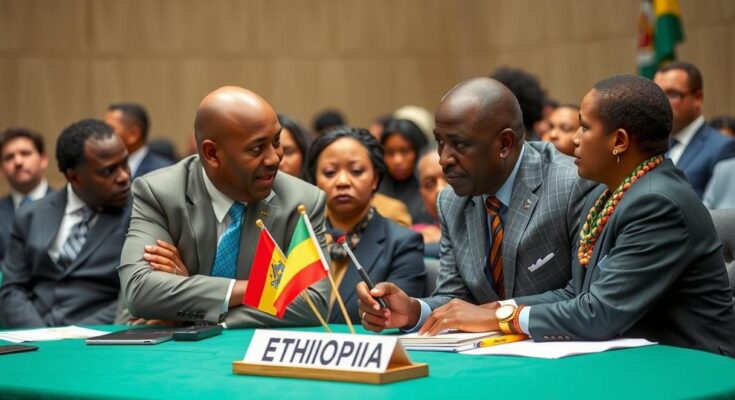The African Union has urged Somalia and Ethiopia to act swiftly on a new agreement aimed at reducing tensions over Ethiopia’s access to maritime resources. The agreement, brokered by Turkey, seeks to address issues following Ethiopia’s controversial deal with Somaliland. Both nations are encouraged to work collaboratively towards mutual prosperity, amid ongoing questions regarding their prior arrangements. The AU and IGAD both commend this as a significant step toward resolving disputes in the region.
The African Union (AU) has called upon Somalia and Ethiopia to swiftly implement a pivotal agreement aimed at de-escalating tensions concerning Ethiopia’s pursuit of access to the sea. AU Commission Chairman Moussa Faki Mahamat emphasized the significance of this agreement, underscoring the imperative for prompt action to fortify the resolution. Tensions between the nations heightened in January after Ethiopia entered a contentious agreement with Somaliland, which involved leasing a coastal area for a port and military establishment. This arrangement also indicated Ethiopia’s potential recognition of Somaliland’s independence, a stance that Somalia vehemently opposes due to concerns over sovereignty violations.
Following mediation efforts by Turkey, the nations reached a “historic” agreement, as announced by Turkish President Recep Tayyip Erdoğan. This accord represents a notable step in providing Ethiopia, a landlocked nation since Eritrea’s independence in 1993, with crucial maritime access. The agreement outlines a collaborative framework for Somalia and Ethiopia to address their differences, emphasizing mutual prosperity. Working discussions on commercial and bilateral arrangements are expected to commence by February and conclude within four months, with Turkey offering mediation as required.
There remains ambiguity regarding the status of Ethiopia’s prior agreement with Somaliland, as a source close to Somaliland’s government suggested that the recent accord does not nullify earlier commitments. The AU and the Intergovernmental Authority on Development (IGAD) hailed the agreement as a significant advancement in resolving bilateral disputes. IGAD’s Executive Secretary Workneh Gebeyehu praised it as a testament to the commitment to peaceful resolution.
In remarks highlighting regional cooperation, Somali President Hassan Sheikh Mohamud stressed the necessity of peace, while Ethiopian Prime Minister Abiy Ahmed reaffirmed his country’s pursuit of coastal access but dismissed any intent to engage in conflict. This accord marks a pivotal juncture in Ethiopia-Somalia relations, nonetheless presenting challenges in transforming this diplomatic achievement into enduring progress.
The call for action from the African Union stems from escalating tensions between Somalia and Ethiopia regarding maritime access, following Ethiopia’s agreement with Somaliland. Somaliland, a region that has declared independence from Somalia, signed a deal which included the leasing of coastlines. Such developments raised sovereignty issues and concerned Somalia regarding Ethiopia’s potential acknowledgment of this self-declared independence. The Turkish-brokered agreement aims to create a pacifying framework for these nations, addressing Ethiopia’s longing for sea access and reaffirming Somalia’s authority in the region. The involvement of both the AU and IGAD adds a layer of diplomatic oversight, indicating a regional effort to resolve protracted conflicts.
In conclusion, the African Union’s call for immediate action on the Somalia-Ethiopia accord highlights the critical need for constructive dialogue and resolution in a region marked by longstanding tensions. The agreement brokered by Turkey is a significant diplomatic milestone, aimed at fostering cooperation and mutual benefits. However, the complexities surrounding Ethiopia’s prior arrangements with Somaliland present ongoing challenges. Achieving lasting stability and effective collaboration will require both nations to translate diplomatic engagements into tangible, sustainable outcomes for their respective peoples.
Original Source: newscentral.africa




